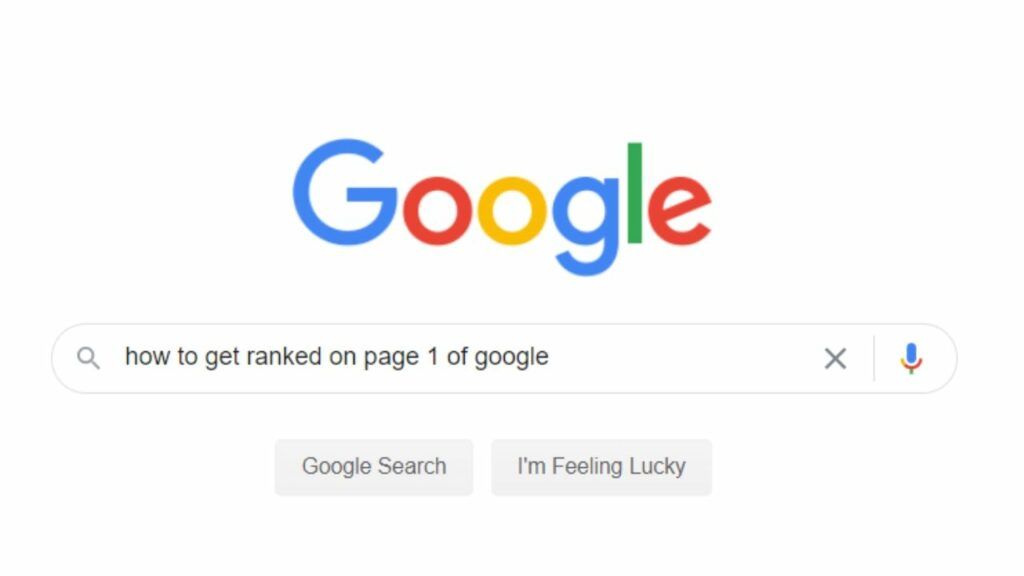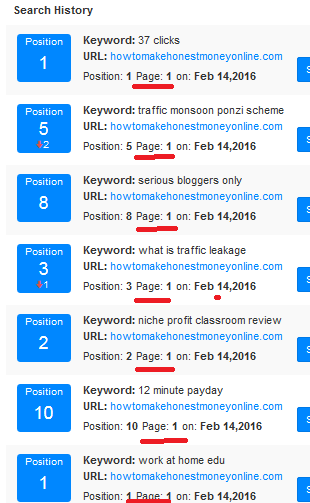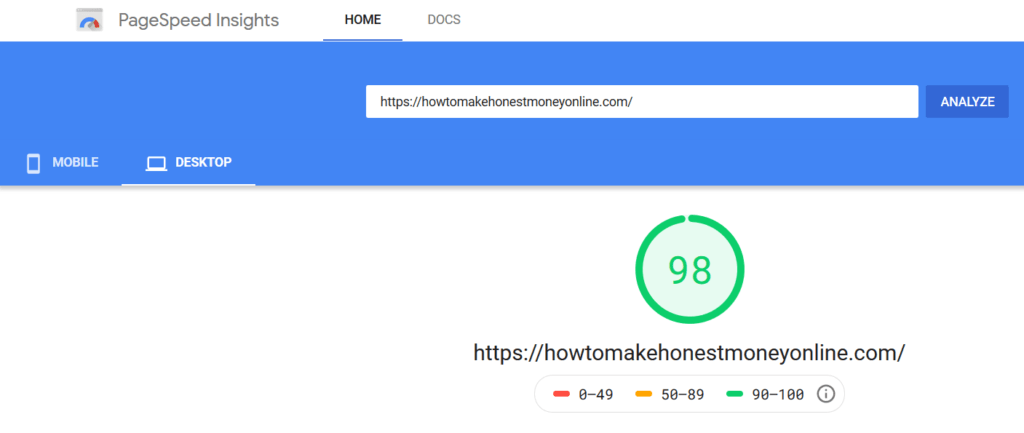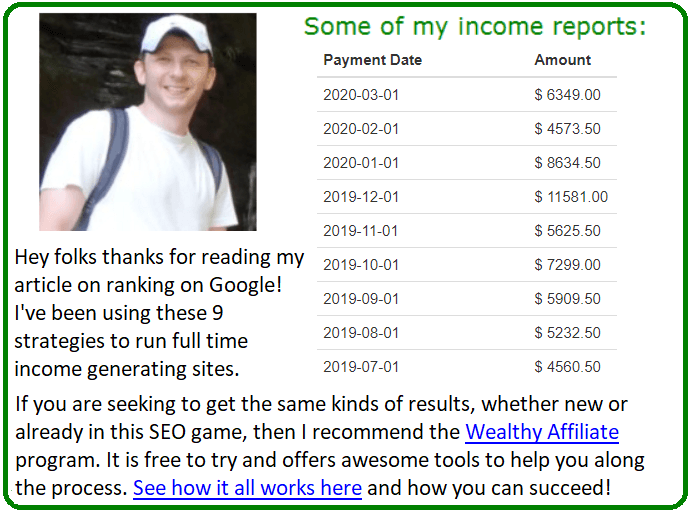Since well over 90% of all search traffic views and dissipates on page 1 of Google, that’s exactly where you want to get ranked on if you want to get that piece of the pie.
But that’s not easy to do if you listen to many of the “gurus” who honestly have no clue how SEO works and give out bad advice that destroys people chances of that.
I however, have used 9 strategies to get ranked on page 1 of Google for many of my blog posts and web pages. On this article, I’ll show you what they are.
I do want you to know a few things:
- Getting ranked on page 1 of Google is not guaranteed with these strategies.
- They work, but you may have too tough of a competition to get to page 1 sometimes.
- Expect rankings to dance around (Google dance) when you have a new site.
- Not all your posts will get ranked on page 1 of Google (it’s how it is).
- Understand what LSI keywords are because they’ll help with this.
- Don’t focus so much on getting 1 page or post to get to page 1 of Google, keep moving forward and repeating the strategies I list.
Any real SEO expert who understands what it really takes to get ranked on page 1 of Google will probably confirm everything I just told you above.
If you ever hear anyone tell you that they’ll be able to rank any keyword you want on page 1 of Google, they are lying to you. It doesn’t work this way. So have realistic expectations and you will have more articles than you can count on page 1 of Google like I do.
Let’e begin.
A preview of the 9 strategies I use to get ranked on page 1 of Google:
- Target a very low competition keyword that is also long tailed.
- Make an awesome title to draw eyes and also use the keyword in that title.
- Create a good snippet to catch Google’s attention.
- Create very high quality content.
- Ensure you internally and externally link on your site.
- Create awesome images.
- Make sure the website theme loads fast.
- Make sure you are running a website that is mobile friendly and secure.
- Make sure you sign up and use Google Webmaster Tools.
Let’s get into each method of ranking on page 1 of Google:
1) Target low competition keywords that are long tailed too.
Finding both profitable keywords and ones that are long tailed too is actually not difficult to do. Think of 3 words or more that get a lot of searches online: Product review keywords, questions, use the Google alphabet technique, ect…
These methods will always get you ideas on these things.
2) Always try to make awesome titles for your found keywords.
It took me a long time to really understand how important titles are for ranking on page 1 of Google. Normally, I’d just find a keyword which was both long tailed and had low competition, but I’d just use that for the title and it was frankly boring and hardly ever got clicks, reads or high rankings, and this all was part of 1 problem:
My titles sucked!
And this is something you need to correct ASAP if you hope to rank on page 1 of Google. And let me tell how you do that by using the title of this article:
It was originally: How to get ranked on page 1 of Google. See how many times I did it!
It isn’t a bad title and the first sentence of that title is the keyword I was chasing, but I changed it because now that it’s:
9 strategies I use to get ranked on page 1 of Google just sounds so much better. People like reading titles with numbers on them. Clickbait titles work very well to get views and Google will be testing how people see your page by showing it to people and seeing if they click on it.
The more that they do, the more odds you’ll get that boost to first page rankings.
3) Create good snippets. Google loves to rank snippets!
Did you see my bulleted list above for the 9 strategies and how I listed it? Well that’s an example of what a snippet looks like. By summarizing it in that type of fashion, I make it easier for Google to see it and rank it. Snippets help your rankings grow substantially.
4) Create very high quality content (it’s always been at the core of this!).
None of the other 8 strategies on this list matter if you don’t have a high quality content article or post. This is what Google looks to rank above all else. Good content is the stem of your success. Everything else on this list is a branch.
If you want ideas on what to write about to have more odds of high quality content showing up on your site, use this blog post’s strategies on what to blog about.
5) Internally and externally link on your website.
Google loves a site that internally links within itself and links externally to other authoritative sites (and by that I mean none affiliate sites). I do it a lot on this article and on about 99% of all my other ones (it’s not by accident, it’s good for SEO).
6) Please make awesome images!
I used to be really lazy about this but imagery, video and basically visual content has really become a major thing in ranking on page 1. Make cool images on Canva and similar sources, as it’ll really help you do this for free. Images do indeed help with rankings!
For example, did you see one of my images above? It showed Google, it had a relevant title, so it came together with the context of the article. This is the kind of stuff you want on your site too!
Note: Make your image featured text the same keyword you are targeting too!
7) Make sure your website theme loads fast.
Website speeds have become a huge ranking factor for Google (as well as the next tip as well). You can test out how well your website loads on places like Google insights to see if it needs improvement.
You want to be in the high 90’s if not 100 for both mobile and desktop if you hope to rank higher on Google:
- Note: Test the speed of your individual pages, not just 1 page.
- Note 2: Run the analyze test TWICE, not once, because the second time is when you get the accurate number.
If it sucks, odds are a theme change, plugin change or even hosting change is necessary to improve it. For themes, I use Generate Press as I run a WordPress website.
8) Mobile friendly + secure websites = better rankings!
I usually mention these 2 tips apart but they are really 2 parts of one thing: Better, more secure sites that are reliable and that makes them more trusted by Google which is why they like websites that have it.
- For mobile friendliness, just make sure you have a good mobile friendly theme.
- For secure websites, make sure you have SSL certificates installed.
Once you have these 2 things installed, it’s really hands off from there.
9) Please use Google Webmaster Tools.
There’s no better way to know how well your website is ranking on Google including for what keywords than using the Google Webmaster Tools program. It is free and it’ll really help Google see your site better.
Your ranking won’t be determined by it, but you will be able to see the progress you are making by following what I tell you and seeing the reflection/reports from Google directly by using this tool. It’ll inform you which articles, keywords and traffic you’re getting straight from Google itself.
My final thoughts on getting ranked on page 1 of Google:
These 9 tips really are at the core of ranking on page 1 of Google and again, I don’t want you to think it’s a 100% guarantee. The SEO is designed in a way where no one site can monopolize on the page 1 rankings and they will fluctuate.
Few website owners know SEO and this is why when you use these tips, you will have an advantage over your other competition on Google.
If you want to add your thoughts on this subject of getting ranked and/or if it helped or not, let me know below!





I guess the mindset of a person also plays a big role cause its the one who has to maintain a discipline of consistency towards his website just like going to a gym, you won’t see results overnight but If you put the effort on it and do everything that you supposed to there no doubt that within a certain time you’re gonna obtain a successfully ranked blog post.
This is very true Erick, the people who I know who succeed in this particular business are at that point because they had a strong mindset and consistently grew their site through content creation.
This is some good stuff. It is always nice to be reassured that I am on the right track since we all know that blogging can be a long road to get our sites to where we want to be.
My site is now 10 months old and I am at 86 posts. Not too bad since I only have a couple hours a day to work on it (goal is 100 at the one year mark) . The main issue that I am running into is that it is getting tough to come up with fresh content ideas so my writing has slowed. When this happens, can you go after quality comments to fill in the gap? Does Google look at this content the same as a it would a normal post?
Yes, comments absolutely give a great boost to SEO. I talked about this here, but overall, comments as SEO boosters for you.
Hello Vitaliy
I’m a regular reader of your site, I usually don’t leave a message, but reading today’s post, I feel like you’re talking to me directly.
Although I publish articles on a regular basis and have 104 posts on my site, I seem to be doing it all wrong, my articles rarely make it to the top 30.
Although I use a keyword tool and chose low competition keywords, it’s like I’m doing the wrong selection or maybe the articles are not good enough.
I agree with you that any program that promises to rank you high in google and other search engines in days/weeks are doing so using some unacceptable methods in the eyes of google and can only do damage long term.
Reading your post, I can see 1 mistake I make time and again, when I got started, I was made to understand that I have to look for minimum 100 searches a month and I think that’s where I’m making a mistake, I might be choosing keywords that are too competitive.
Will try to go even for lower searches with even lesser competition, that may bring in better results.
As usual, your post is very informative, thanks.
Hi Roamy, I do not think the issue the issue is what you say it is. Although I don’t know about your site specifically, whenever someone tells me about their traffic problems, I always refer them to do some sort of SEO audit of their page like this and see how their site matches with the checklist I set up.
Now even though you have over a 100 posts and I think you’re doing great, here’s some things I’d like to know from you regarding your site. If you tell me this, I can help you figure out how to accelerate your results:
1) How old is your site?
2) You say you publish posts everyday, but have you been doing that since the domain was purchased? Or did you write a few posts initially, stop, then go back to writing after a long break?
3) When you chase keywords, I am always going to advise chasing higher searched keywords, however, the competition is what matters most to me. Do you have a low competition for each keyword you write about and if so, give me a number of the competition you consider to be good enough to target.
4) Are your titles nice looking? Simply writing down keywords as your title is really not the best way to attract more clicks.
5) How many words would you say you write on each article?
6) Do you actively interlink your articles with other articles on the site?
7) Did you register your site with webmaster tools and Google analytics? Doing this will really help show how the site’s performing.
8) Do you do affiliate marketing and if so, how often do you put affiliate links on your site? Do you put them on every new page you write?
I know it’s a lot of questions, but if I can as many answers for them as possible, I can definintely give you a definitive answer on how you’re doing and what to do moving forward 🙂
This is a brilliant read.
My website is slowly getting traction with Google in terms of rankings and traffic. What you mentioned in your article put my mind at ease. The part of getting at least 100 articles on one’s website.
At the moment I am on 85 articles, and will keep adding content. Love your advice about selecting the keyword.
Do you use a specific guide as to what the maximum amount of competition you would allow when selecting the keyword?
Thanks
Roopesh
As long as the keyword has a green light in the competition department (and I explain that here), and it relates to my niche and is also a long tailed keyword, I’ll write about it Roopesh, the more content I write, the better and higher my site will rise.
This is a brilliant read.
My website is slowly getting traction with Google in terms of rankings and traffic. What you mentioned in your article put my mind at ease. The part of getting at least 100 articles on one’s website.
At the moment I am on 85 articles, and will keep addicting content. Love your advice about selecting the keyword.
Do you use a specific guide as to what the maximum amount of competition you would allow when selecting the keyword?
Thanks
Roopesh
I’m not sure if it was you who asked me this same question Roopesh, but I believe I did mention it before. Typically there is a number you can attach to keyword competition, if you use this type of approach and if you do, I’d say anything under 100 competing pages is good.
Double digit competition is great.
Single digit competition is AWESOME.
Great article and good insights man. I liked your methods of ranking number 1 on google pages. Wealthy Affiliate is a great community and has amazing tools knowledge on how to expand your internet business.
I can’t believe that you’ve already posted like 200 articles that are some seriously good work, I give props to you for that. Thanks again for sharing, and I wish you good luck on your journey.
It’s actually over 500 articles now 🙂
A great article indeed. I myself believe in long quality articles. There are some people for whom short articles work the best, but I’ve found that majority of big names in blogging & marketing industry to be writing long quality articles without making it boring.
I don’t really think one needs 100 pages to rank well in google or rank well for some keywords. I agree that more quality content helps, but it’s not really necessary to have 100 pages to rank that well.
Creating 35-40 articles, long ones and making them all about quality can be just enough to help you stand out in the crowd.
Though you do need to appoint some strategies to make your content reach a wider audience.
But overall, it’s a great read.
Thanks a lot.
Not everyone will need to go as far as the 100 article mark, but that is more meant for people who have no social media or general following. Lots of the big names you speak of have a big following, so even writing 1 article and having that following crave the content and comment on it, while also sharing it is why certain blogs and people reach results faster than those who start without those perks.
I have seven content driven websites, some are e-commerce with blogs and I have found what you are describing to be the absolute truth. My two main websites are only over a year young :)….it seems the more quantity I write the better it ranks. I also agree the best keywords are still available, as the world changes so does the reader’s interest and search phrases.
Since you seem to understand this process better than most, what are the biggest changes you are experiencing within Google? Do you forecast any new conditions to shake it up a bit? Congratulations on 400 posts, this takes a lot of dedication and I can tell you treat this with a scheduled determination. It seems I need to get busy, I can see the goals I need to reach now.
With Kind Regards,
Linda
Hi Linda, as usual, it is a pleasure to get your thoughts on my posts. Regarding both your questions on the changes I see from Google and forecasts, I really sum it up in my post on Penguin 4.0 which is basically all you need to know regarding both those issues.
I personally see nothing but improvement from Google on ranking content based on the same parameters I’ve been talking about to reach page 1.
I totally agree with so many things you said, and can really take it to heart.
100 pages is a good number. I think a lot of people think their little starter 5 pages is going to get them where they want to be and it’s just not practical.
I also agree about the length of articles. I’m really tired myself of looking up information and seeing these cryptic short responses to my search surrounded by a million ads which take forever to load followed by a pop up that covers the miserable little paragraph I’m trying to get to LOL.
You’ve set a huge writing goal for yourself and I’m totally impressed by how much you’ve done so far. 400 posts is a lot of great work. Good job and good info… thanks for the article.
I am very glad that I came across this article. I have only just started my website but I see I have a very long way to go. I can’t think how I will get to 100, let alone continually add like you do. The tip about internal links is good also and I will try to implement that.
You’re not going to get to a 100 articles quickly and especially alone, but if you set a schedule for writing a certain amount every week, you will eventually reach it. Honestly a 100 articles, written once a day would only take you 3 months and a few weeks to reach.
Thank you for the great post it is very useful. I have a website under construction and getting it ranked on top in the google search engine has been quite a challenge. How long did it take you to get the top rankings? I will try and apply the tips you have stated. Thanks so much.
You’ll get some first page rankings within a few months if your keyword’s competition is low enough but for more popular search terms, I would say over a year, but it snowballs in that you’ll get more and more 1st page rankings as time goes along.
Wow. This is very interesting and it does make sense. I agree that you need a good amount of articles. Though I’m not sure about 2,000 word articles. I would think that people would consider quality over quantity. I suppose some could be that length though. Thanks for the information!
They do Kevin, but if you offer quality, the more you offer it, the better which is why articles that tend to rank higher on Google also by correlation have longer content.
Obviously you have a lot of experience about ranking on page 1 and you can give people great tips about rankings. I agree that you have to look for low keyword competition so you can have more success. The problem is that most of good keywords are already taken (QSR over 300).
This is not true Karlo. In fact, I would say most of the good keywords are NOT “taken” and you have more “green” keywords at your disposal than competitive ones, just add some extra terms to your keyword search that makes sense and you’ll see it has less competition.